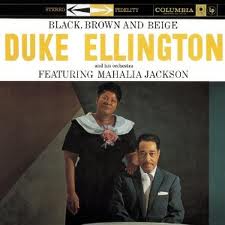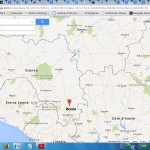I came to Ellington late in life. Despite the fact that my Pops worked with him and Mercer. It was like that with most jazz music, I was late.
When I did catch on I had a whole library of music at my disposal to really get down with, but I can say without a doubt the 2 albums that really caught my attention and held it for quite some some time. One was, an IMPULSE! release, Duke Ellington & John Coltrane and the other was Money Jungle with Mingus and Max (United Artists 1963, Blue Note 1987 and 2002). If you are not familiar with these recordings…do yourself a favor…
Pops told me about Duke and told me how he had traveled the world as musician with the US Government. I later came to find out it was with the US Department of the State’s Jazz Ambassadors. In this program Ellington and his band traveled throughout Africa, Asia, and the Middle East.
While listening to a segment of Christopher Lydon’s Radio Open Source, Lydon’s guest Harvey Cohen author of Duke Ellington’s America. In the segment Cohen talks at length about Ellington’s Black, Brown and Beige, which was first envisioned by Ellington as an opera. The opera’s main character was a timeless African American man named Boola and the music of Ellington’s band was written as a companion to Boola’s 39-page narrative in verse, where he talks about his life from the belly of a ship to the present (Ellington’s day). This really piqued my interest so I do some Google searches. What I found further piqued my interest and set off more questions. Turns out that Boola is the name of a region in Guinea. This made think that perhaps Ellington in his travels met someone from Boola, or maybe someone told him about the region, whatever the case; I don’ think it was coincidence that he named this character Boola, nor that Boola’s experiences became the basis for Black, Brown and Beige and many of those compositions are meant as “tone parallels” to the Boola’s monologues.
A few days ago as I was preparing this post, I found that in addition to Black, Brown and Beige, Ellington made other albums that expressed his interests and gaze toward Africa, The Togo Brava Suite is one such recording. Ellington may not have articulated it as such, but it appears that he was creating work that was pan-African. I wonder how far Ellington would have taken his pan-African efforts and how would that have affected our understanding of African music as classical music (not Classical music)? Was Boola’s verse narrative the first perform-a-form?
Over the 3 years that I will be here in Africa, if I get a chance to visit Boola I will report back on what I find…

